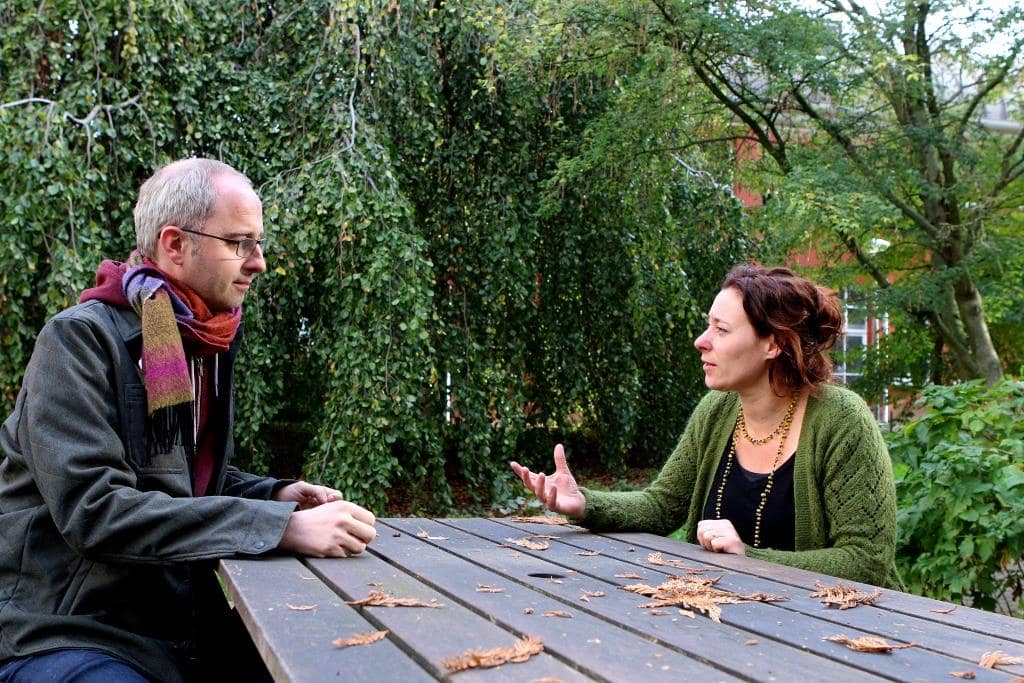
Duo interview: On being a journal editor
What do professors do all day? Right from the start of their Bachelor program, students know that professors teach. Additionally, most students find soon after the start of their first year in the studies that professors conduct research. But did you know that they are also expected to complete various administrative tasks? These may range from chairing the departmental examinations committee, to serving in a faculty working group on internationalization, to representing local colleagues in a national network, to being on the board of an international organization.
Are you, like many other students, unclear about what exactly these types of administrative tasks entail? Mindwise decided to lift the veil on one task regularly being taking on by professors: being an editor for a scientific journal. Specifically, we asked Dr. Rafaele Huntjens, associate professor of clinical psychology, about being an Associate Editor for the Journal of Behavior Therapy and Experimental Psychiatry, and Dr. Kai Epstude, associate professor of social psychology, about being Editor-in-Chief for Social Psychology.
MINDWISE: Why did you decide to become an editor?
Dr. Huntjens: For me there were two main reasons to become Associate Editor. The first reason was to get a view “behind the scenes”, that is, inside knowledge about the review and editorial process. This has indeed proved useful and interesting. For example, I am now more aware of the importance of adhering to the journal’s aims and scope, so I understand better why manuscripts are sent out for review or immediately rejected. Besides, I gained insight in the (partly automated) systems used to select possible reviewers (other than those suggested by the manuscript authors) and the criteria underlying this selection.
My second reason was that as Associate Editor, I hoped to get a broader view of the field of experimental psychopathology. With the Journal of Behavior Therapy and Experimental Psychiatry, submitted manuscripts are not assigned to one of the four Associate Editors based on topic expertise, but randomly. Consequently, I get assigned manuscripts that start from different theories and use different experimental paradigms from those used in my own field (that of trauma-related and dissociative disorders). This provides a fresh input of new ideas.
“I am now more aware of the importance of adhering to the journal’s aims and scope, so I understand better why manuscripts are sent out for review or immediately rejected.”
Dr. Epstude: I have always done quite a lot of manuscript reviewing, mostly because many of the people I worked with were journal editors. When, some years ago, I was asked to become Associate Editor at Experimental Psychology, I thought this was a good opportunity to get editorial experience myself. It was also a good choice because social cognition research (which is in my area of expertise) is not the main focus of Experimental Psychology. So, I did not immediately have to handle a huge number of manuscripts and could take some time to learn how to be an editor.
About 3 years ago, I was asked to consider becoming Editor-in-Chief for Social Psychology. Naturally that is much more work, which is added on top of my regular tasks at the University of Groningen. The reason why I decided to become the Editor-in-Chief anyway is that the field of social psychology is changing very rapidly, also under the critical eye of the scientific community and the wider public, especially in the Netherlands. I figured I had the choice between becoming grumpy after an overdose of Twitter or the Volkskrant science section, and actually doing something that will affect the way research is done. Editing a journal such as Social Psychology which is small but linked to closely linked to open science and transparent research practices, provides a good chance to contribute to an important enterprise.
MINDWISE: Can you give an example of a challenge that you faced during your editorship, and how you dealt with it?
Dr. Epstude: Social Psychology is quite closely linked to the changing practices within our research area. We were the first journal to have a special issue on replications, and still regularly publish replications. However, such manuscripts are not complete exceptions anymore (compared to a few years ago), and there are now better criteria for how to evaluate them. Moreover, some findings attract replications by quite a lot of different researchers. Therefore, replication papers may also get rejected, because they do not fit the current standards. Sometimes a finding has already been shown to replicate (or not) by various other researchers. Especially in the latter case, authors respond very negatively. When I anticipate such a response, I usually consult with at least one Associate Editor who has expertise in the specific area of research. This leads to a more detailed desk-rejection letter, which seems to help take away the idea that we are hostile towards replication manuscripts.
“Sometimes a finding has already been shown to replicate (or not) by various other researchers. Especially in the latter case, authors respond very negatively.”
Dr. Huntjens: The challenges I face also mainly resolve around issues related to publication bias and the replication crisis, and how to integrate the guidelines and suggestions following from the critical analysis of this crisis into our editorial process. Authors and reviewers are not always knowledgeable about the problems (e.g., harking, p-hacking) so I feel a responsibility to make them more aware of these problems and their possible solutions. We value replication studies irrespective of the outcome and ask for official trial registration of all clinical trials. However, the practical application of some suggestions is not always easy. For example, authors can be asked to clearly distinguish between confirmatory and exploratory analyses and, if needed, correct for family-wise error, but it is more difficult to allow registered reports and make data available to readers (e.g., allowing for anonymity and sufficient data information at the same time). The editorial team of the Journal of Behavior Therapy and Experimental Psychiatry is working hard to develop procedures for this.
Dr. Huntjens asks Dr. Epstude: You mention replication studies as an important example of changing research practices. What is your take on other changes, more specifically open data access? Do you think it is practically feasible in your field to incorporate this?
Dr. Epstude: Making materials and data available is mandatory for publication in Social Psychology (since the beginning of 2018). To reduce the workload for authors, we only ask for those things right before the final acceptance of the paper (unless the editor or the reviewers request them earlier). That seems to work well. But while it is relatively easy for studies using written materials, I can see privacy issues arising for audiovisual or qualitative data. In such cases, we ask for the code books and the coded data. Luckily, so far, there have been no major issues since we introduced this mandatory step.
“while it is relatively easy for studies using written materials, I can see privacy issues arising for audiovisual or qualitative data”
Dr. Epstude asks Dr. Huntjens: Statistical power is a very important criterion for evaluating studies and it receives increasingly more attention. In social psychology, there is simply a tendency for larger and larger samples. I was wondering how clinical psychology research is dealing with this issue, given that large samples might be difficult to get?
Dr. Huntjens: Indeed the trend for larger samples also applies to patient studies. Clinical trials have to be preregistered, taking sample size into account. I am slightly more lenient when it comes to studies of patients with rare conditions, as it is often simply not feasible to gather large enough samples then. At the same time, we ask researchers to optimize their study design (e.g., use multiple repeated measures), apply appropriate statistical techniques, and add power indications. Luckily in the field we also have the option of analog studies as an additional way for investigating the mechanisms underlying disorders at play; these studies can be done in large samples which ensures optimal internal validity.
“we ask researchers to optimize their study design (e.g., use multiple repeated measures), apply appropriate statistical techniques, and add power indications”
MINDWISE: Being an editor seems like quite a bit of (extra) work. Do you feel the university values this kind of service to the scientific community?
Dr. Huntjens: Indeed being (Associate) Editor takes a lot of time. At the moment I do not get any credit for it in terms of reduced teaching, so I do this mainly in my own time. This is a strange situation, as the editorial process is really a fundamental part of the scientific endeavor of publishing high-quality papers.
“the editorial process is really a fundamental part of the scientific endeavor of publishing high-quality papers”
Dr. Epstude: I also mostly do this work in my own time. As I have to read up to 200 papers per year and make an initial decision regarding desk rejection, lots of Sundays are devoted to just that. Our Faculty views such tasks in terms of how they benefit our resumes. I agree that this a strange situation. The University aims for transparent research practices and the highest methodological standards. However, the University should not forget that it is the (Associate) Editors who can promote such standards in a quite powerful manner for an entire discipline.



